#big car
Text
"Efficiency" left the Big Three vulnerable to smart UAW tactics
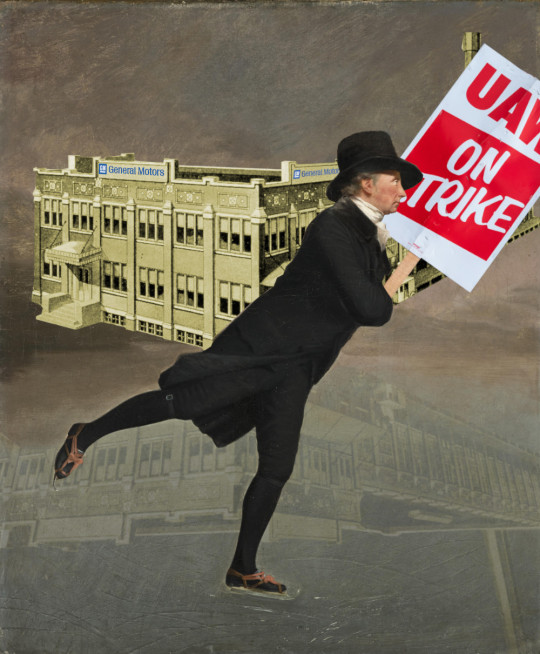
Tomorrow (September 22), I'm (virtually) presenting at the DIG Festival in Modena, Italy. Tomorrow night, I'll be in person at LA's Book Soup for the launch of Justin C Key's "The World Wasn’t Ready for You." On September 27, I'll be at Chevalier's Books in Los Angeles with Brian Merchant for a joint launch for my new book The Internet Con and his new book, Blood in the Machine.

It's been 143 days since the WGA went on strike against the Hollywood studios. While early tactical leaks from the studios had studio execs chortling and twirling their mustaches about writers caving once they started losing their homes, the strikers aren't wavering – they're still out there, pounding the picket lines, every weekday:
https://www.cnbc.com/2023/08/09/how-hollywood-writers-make-ends-meet-100-days-into-the-writers-guild-strike.html
The studios obviously need writers. That gleeful, anonymous studio exec who got such an obvious erotic charge at the thought of workers being rendered homeless as punishment for challenging his corporate power completely misread the room, and his comments didn't demoralize the writers. Instead, they inspired the actors to go on strike, too.
But how have the writers stayed out since May Day? How have the actors stayed out for 69 days since their strike started on Bastille Day? We can thank the studios for that! As it turns out, the studios have devoted so much energy to rendering creative workers as precarious as possible, hiring as little as they can getting away with and using punishing overtime as a substitute for adequate staffing that they've eliminated all the workers who can't survive on side-hustles and savings for six or seven months at a time.
But even for those layoff-hardened workers, long strikes are brutal, and of course, all the affiliated trades, from costumers to grips, are feeling the pain. The strike fund only goes so far, and non-striking, affected workers don't even get that. That's why I've been donating regularly to the Entertainment Community Fund, which helps all affected workers out with cash transfers (I just gave them another $500):
https://secure2.convio.net/afa/site/Donation2?df_id=8117&8117.donation=form1&mfc_pref=T
As hot labor summer is revealed as a turning point – not just a season – long strikes will become the norm. Bosses still don't believe in worker power, and until they get their minds right, they're going to keep on trying to starve their workforces back inside. To get a sense of how long workers will have to hold out, just consider the Warrior Met strike, where Alabama coal-miners stayed out for 23 months:
https://www.thenation.com/article/activism/warrior-met-strike-union/
As Kim Kelly explained to Adam Conover in the latest Factually podcast, the Alabama coal strikers didn't get anywhere near the attention that the Hollywood strikers have enjoyed:
https://www.youtube.com/watch?v=UvyMHf7Yg0Q
(To learn more about the untold story of worker organizing, from prison unions to the key role that people of color and women played in labor history, check out Kelly's book, "Fight Like Hell," now in paperback:)
https://www.simonandschuster.com/books/Fight-Like-Hell/Kim-Kelly/9781982171063
Which brings me to the UAW strike. This is an historic strike, the first time that the UAW has struck all of the Big Three automakers at once. Past autoworkers' strikes have marked turning points for all American workers. The 1945/46 GM strike established employers' duty to cover worker pensions, health care, and cost of living allowances. The GM strike created the American middle-class:
https://prospect.org/labor/2023-09-18-uaw-strikes-built-american-middle-class/
The Big Three are fighting for all the marbles here. They are refusing to allow unions to organize EV factories. Given that no more internal combustion cars will be in production in just a few short years, that's tantamount to eliminating auto unions altogether. The automakers are flush with cash, including billions in public subsidies from multiple bailouts, along with billions more from greedflation price-gouging. A long siege is inevitable, as the decimillionaires running these companies earn their pay by starving out their workers:
https://www.businessinsider.com/general-motors-ceo-mary-barra-salary-auto-workers-strike-uaw-2023-9
The UAW knows this, of course, and their new leadership – helmed by the union's radical president Shawn Fain – has a plan. UAW workers are engaged in tactical striking, shutting down key parts of the supply chain on a rolling basis, making the 90-day strike fund stretch much farther:
https://prospect.org/blogs-and-newsletters/tap/2023-09-18-labors-militant-creativity/
In this project, they are greatly aided by Big Car's own relentless pursuit of profit. The automakers – like every monopolized, financialized sector – have stripped all the buffers and slack out of their operations. Inventory on hand is kept to a bare minimum. Inputs are sourced from the cheapest bidder, and they're brought to the factory by the lowest-cost option. Resiliency – spare parts, backup machinery – is forever at war with profits, and profits have won and won and won, leaving auto production in a brittle, and easily shattered state.
This is especially true for staffing. Automakers are violently allergic to hiring workers, because new workers get benefits and workplace protection. Instead, the car companies routinely offer "voluntary" overtime to their existing workforce. By refusing this overtime, workers can kneecap production, without striking.
Enter "Eight and Skate," a campaign among UAW workers to clock out after their eight hour shift. As Keith Brower Brown writes for Labor Notes, the UAW organizers are telling workers that "It’s crossing an unofficial picket line to work overtime. It’s helping out the company":
https://labornotes.org/2023/09/work-extra-during-strike-auto-workers-say-eight-and-skate
Eight and Skate has already started to work; the Buffalo Ford plant can no longer run its normal weekend shifts because workers are refusing to put in voluntary overtime. Of course, bosses will strike back: the next step will be forced overtime, which will lead to the unsafe conditions that unionized workers are contractually obliged to call paid work-stoppages over, shutting down operations without touching the strike fund.
What's more, car bosses can't just halt safety stoppages or change the rules on overtime; per the UAW's last contract, bosses are required to bargain on changes to overtime rules:
https://uaw.org/wp-content/uploads/2023/09/Working-Without-Contract-FAQ-FINAL-2.pdf
Car bosses have become lazily dependent on overtime. At GM's "highly profitable" SUV factory in Arlington, TX, normal production runs a six-days, 24 hours per day. Workers typically work five eight-hour days and nine hours on Saturdays. That's been the status quo for 11 years, but when bosses circulated the usual overtime signup sheet last week, every worker wrote "a big fat NO" next to their names.
Writing for The American Prospect, David Dayen points out that this overtime addiction puts a new complexion on the much-hyped workerpocalypse that EVs will supposedly bring about. EVs are much simpler to build than conventional cars, the argument goes, so a US transition to EVs will throw many autoworkers out of work:
https://prospect.org/labor/2023-09-20-big-threes-labor-shortages-uaw/
But the reality is that most autoworkers are doing one and a half jobs already. Reducing the "workforce" by a third could leave all these workers with their existing jobs, and the 40-hour workweek that their forebears fought for at GM inn 1945/46. Add to that the additional workers needed to make batteries, build and maintain charging infrastructure, and so on, and there's no reason to think that EVs will weaken autoworker power.
And as Dayen points out, this overtime addiction isn't limited to cars. It's also endemic to the entertainment industry, where writers' "mini rooms" and other forms of chronic understaffing are used to keep workforces at a skeleton crew, even when the overtime costs more than hiring new workers.
Bosses call themselves job creators, but they have a relentless drive to destroy jobs. If there's one thing bosses hate, it's paying workers – hence all the hype about AI and automation. The stories about looming AI-driven mass unemployment are fairy tales, but they're tailor made for financiers who get alarming, life-threatening priapism at the though of firing us all and replacing us with shell-scripts:
https://pluralistic.net/2023/03/09/autocomplete-worshippers/#the-real-ai-was-the-corporations-that-we-fought-along-the-way
This is why Republican "workerism" rings so hollow. Trump's GOP talks a big game about protecting "workers" (by which they mean anglo men) from immigrants and "woke captialism," but they have nothing to say about protecting workers from bosses and bankers who see every dime a worker gets as misappropriated from their dividend.
Unsurprisingly, conservative message-discipline sucks. As Luke Savage writes in Jacobin, for every mealymouthed Josh Hawley mouthing talking points that "support workers" by blaming China and Joe Biden for the Big Three's greed, there's a Tim Scott, saying the quiet part aloud:
https://jacobin.com/2023/09/republicans-uaw-strike-hawley-trump-scott/
Quoth Senator Scott: "I think Ronald Reagan gave us a great example when federal employees decided they were going to strike. He said, you strike, you’re fired. Simple concept to me. To the extent that we can use that once again, absolutely":
https://twitter.com/American_Bridge/status/1704136706574741988
The GOP's workerism is a tissue-thin fake. They can never and will never support real worker power. That creates an opportunity for Biden and Democrats to seize:
https://pluralistic.net/2023/09/18/co-determination/#now-make-me-do-it
Reversing two generations of anti-worker politics is a marathon, not a sprint. The strikes are going to run for months, even years. Every worker will be called upon to support their striking siblings, every day. We can do it. Solidarity now. Solidarity forever.



If you'd like an essay-formatted version of this post to read or share, here's a link to it on pluralistic.net, my surveillance-free, ad-free, tracker-free blog:
https://pluralistic.net/2023/09/21/eight-and-skate/#strike-to-rule
4K notes
·
View notes
Text


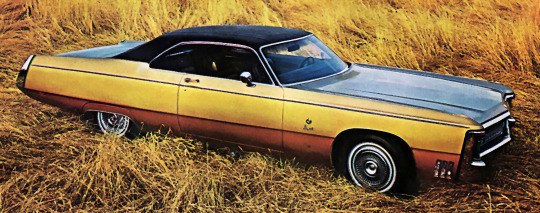

Imperial LeBaron 2-door Hardtop, 1969. The fuselage era began in August 1968 when Chrysler's new C-body cars for the '69 model year were revealed, designed under Elwood Engel. It was the first year a LeBaron coupe was offered. At 229.7 in (5.8 metres) it became the longest non-limousine car made in America.
#Imperial#Imperial LeBaron#Imperial LeBaron 2-door Hardtop#pillarless hardtop#1969#fuselage era#Elwood Engel#luxury car#big car#concealed headlamps
176 notes
·
View notes
Text

The new beast 🙊

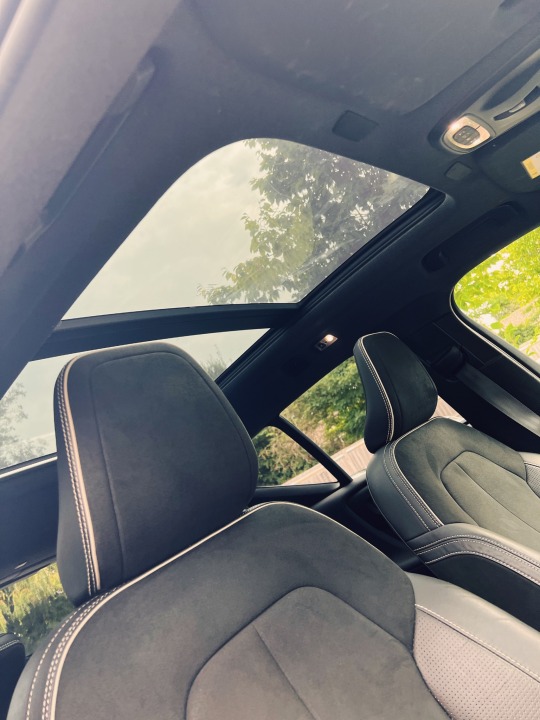

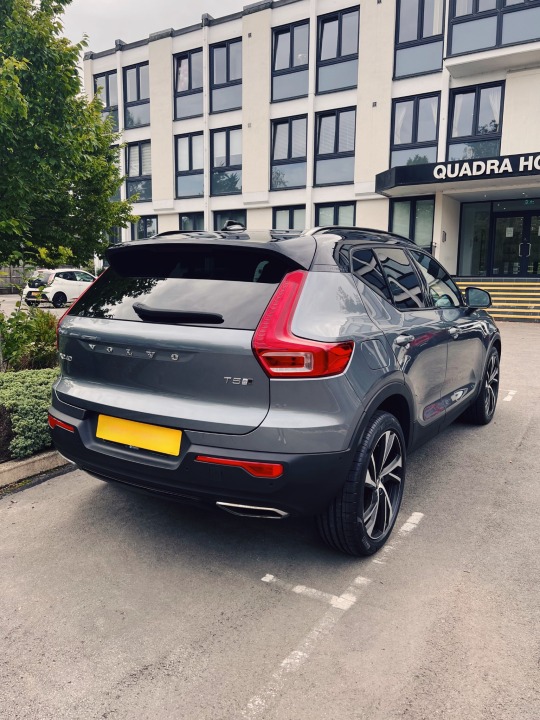
62 notes
·
View notes
Text

Doesn't she look good parked on the drive
8 notes
·
View notes
Text
I fixed my CAR TODAY now the WOKE MOB will never CATCH ME!!!!!!
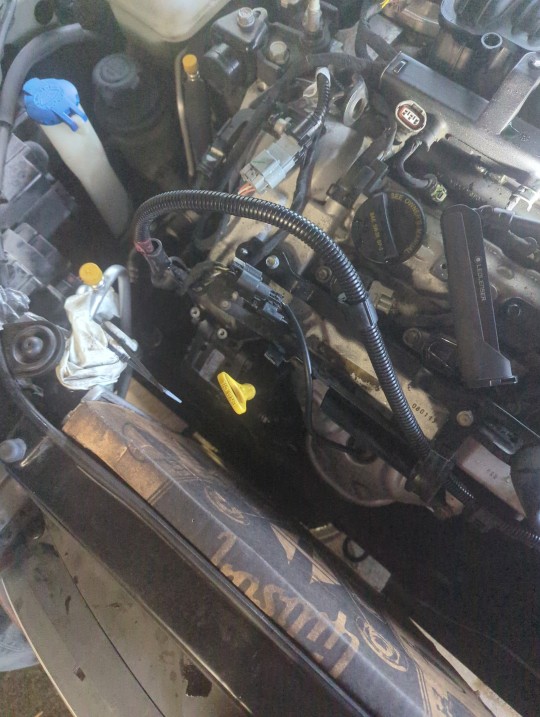
3 notes
·
View notes
Text

#chevrolet impala#impala#impala 4 door#chevy#history#classic#classic car#classic cars#chevy impala#american classic car#big car
19 notes
·
View notes
Text
TOQGER and Big Car
The fact that RESSHA SENTAI TOQGER (Train-themed Power Rangers season) wasn’t adapted in the USA is most likely due to Big Car manipulating funding behind the scenes. They don’t want swathes of children enjoying a show about trains. They don’t want swathes of children growing up asking why the USA doesn’t have trains anymore. Because the biggest threat to Big Car is the train!
So, to all my mutuals that mourned the loss of TOQGER’s adaptation, we all have Big Car to blame >:(
6 notes
·
View notes
Video
youtube
The IMPact of poor choices - the Hillman Imp Story
A good car in theory. They were just indecisive about it, causing a protected development. They missed their window to launch before the Mini, and were always rushing to catch up.
They also got screwed over by the government. The government was in full post-war Fascism, and forced them to build outside of Glasgow. This made them too far from their parts manufacturing, causing dramatic delays. The workforce were not used to building cars, and did a pretty terrible job. The two combined together to remove any profitability the car could have have, as the workers frequently went on strike. And I need to put this into context, as the factory only lasted 10 years.
As for being a good car, pretty much all of the car critics loved it’s performance, it just didn’t suit the needs of the market.
Runtime: 22:48
2 notes
·
View notes
Text
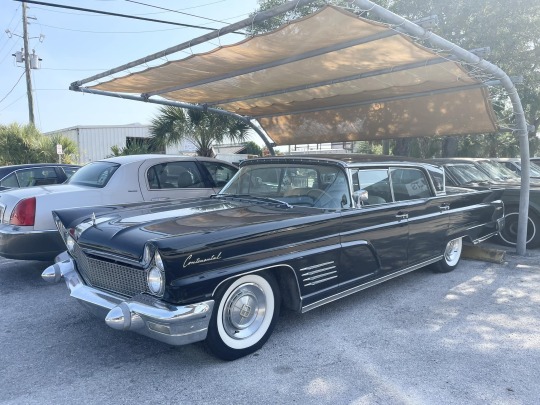
1960 Continental Mark V
0 notes
Text

#good omens#´hello friends!! how are you!!#I hope you're doing well! ( ´ ▽ ` )#I have a big cough but otherwise I am good! It's nothign bad I am just very slimey#usually I am not a cough person I am not sure where this is coming from#most of the time I just get a stuffy nose#has my nose gotten stronger#but there are good news too I have already found a VERY good chestnut to put into my pocket this autumn!! its very small! (❁´▽`❁)#it's been a very warm autumn in Germany so far so it has not really felt like fall yet#but yesterday it was all rainy and stormy and I had two new books and it was the best day possible to have a slimey cough (:#and now I feel SO much autumn I am close to buying a set of window colors#I do not know what I would to with the window colors I just have this strong urge in me to buy a window color set#the last time I did a window color was at the birtday of a class mate I think she turned 9 and I made a deer#but for some reason we did this craft 5 minutes before we all had to leave so we had to carry our window color deer home wet#unfortunatly for the deer and me I fell down the stairs of her house and smeared the deer all over me and i screamed the entire drive home#which wasn't very long but it probably felt very long for the mother who had a screaming child covered in window color deer inside her car
12K notes
·
View notes
Text
Autoenshittification

Forget F1: the only car race that matters now is the race to turn your car into a digital extraction machine, a high-speed inkjet printer on wheels, stealing your private data as it picks your pocket. Your car’s digital infrastructure is a costly, dangerous nightmare — but for automakers in pursuit of postcapitalist utopia, it’s a dream they can’t give up on.
Your car is stuffed full of microchips, a fact the world came to appreciate after the pandemic struck and auto production ground to a halt due to chip shortages. Of course, that wasn’t the whole story: when the pandemic started, the automakers panicked and canceled their chip orders, only to immediately regret that decision and place new orders.
But it was too late: semiconductor production had taken a serious body-blow, and when Big Car placed its new chip orders, it went to the back of a long, slow-moving line. It was a catastrophic bungle: microchips are so integral to car production that a car is basically a computer network on wheels that you stick your fragile human body into and pray.
The car manufacturers got so desperate for chips that they started buying up washing machines for the microchips in them, extracting the chips and discarding the washing machines like some absurdo-dystopian cyberpunk walnut-shelling machine:
https://www.autoevolution.com/news/desperate-times-companies-buy-washing-machines-just-to-rip-out-the-chips-187033.html
These digital systems are a huge problem for the car companies. They are the underlying cause of a precipitous decline in car quality. From touch-based digital door-locks to networked sensors and cameras, every digital system in your car is a source of endless repair nightmares, costly recalls and cybersecurity vulnerabilities:
https://www.reuters.com/business/autos-transportation/quality-new-vehicles-us-declining-more-tech-use-study-shows-2023-06-22/
What’s more, drivers hate all the digital bullshit, from the janky touchscreens to the shitty, wildly insecure apps. Digital systems are drivers’ most significant point of dissatisfaction with the automakers’ products:
https://www.theverge.com/23801545/car-infotainment-customer-satisifaction-survey-jd-power
Even the automakers sorta-kinda admit that this is a problem. Back in 2020 when Massachusetts was having a Right-to-Repair ballot initiative, Big Car ran these unfuckingbelievable scare ads that basically said, “Your car spies on you so comprehensively that giving anyone else access to its systems will let murderers stalk you to your home and kill you:
https://pluralistic.net/2020/09/03/rip-david-graeber/#rolling-surveillance-platforms
But even amid all the complaining about cars getting stuck in the Internet of Shit, there’s still not much discussion of why the car-makers are making their products less attractive, less reliable, less safe, and less resilient by stuffing them full of microchips. Are car execs just the latest generation of rubes who’ve been suckered by Silicon Valley bullshit and convinced that apps are a magic path to profitability?
Nope. Car execs are sophisticated businesspeople, and they’re surfing capitalism’s latest — and last — hot trend: dismantling capitalism itself.
Now, leftists have been predicting the death of capitalism since The Communist Manifesto, but even Marx and Engels warned us not to get too frisky: capitalism, they wrote, is endlessly creative, constantly reinventing itself, re-emerging from each crisis in a new form that is perfectly adapted to the post-crisis reality:
https://www.nytimes.com/2022/10/31/books/review/a-spectre-haunting-china-mieville.html
But capitalism has finally run out of gas. In his forthcoming book, Techno Feudalism: What Killed Capitalism, Yanis Varoufakis proposes that capitalism has died — but it wasn’t replaced by socialism. Rather, capitalism has given way to feudalism:
https://www.penguin.co.uk/books/451795/technofeudalism-by-varoufakis-yanis/9781847927279
Under capitalism, capital is the prime mover. The people who own and mobilize capital — the capitalists — organize the economy and take the lion’s share of its returns. But it wasn’t always this way: for hundreds of years, European civilization was dominated by rents, not markets.
A “rent” is income that you get from owning something that other people need to produce value. Think of renting out a house you own: not only do you get paid when someone pays you to live there, you also get the benefit of rising property values, which are the result of the work that all the other homeowners, business owners, and residents do to make the neighborhood more valuable.
The first capitalists hated rent. They wanted to replace the “passive income” that landowners got from taxing their serfs’ harvest with active income from enclosing those lands and grazing sheep in order to get wool to feed to the new textile mills. They wanted active income — and lots of it.
Capitalist philosophers railed against rent. The “free market” of Adam Smith wasn’t a market that was free from regulation — it was a market free from rents. The reason Smith railed against monopolists is because he (correctly) understood that once a monopoly emerged, it would become a chokepoint through which a rentier could cream off the profits he considered the capitalist’s due:
https://locusmag.com/2021/03/cory-doctorow-free-markets/
Today, we live in a rentier’s paradise. People don’t aspire to create value — they aspire to capture it. In Survival of the Richest, Doug Rushkoff calls this “going meta”: don’t provide a service, just figure out a way to interpose yourself between the provider and the customer:
https://pluralistic.net/2022/09/13/collapse-porn/#collapse-porn
Don’t drive a cab, create Uber and extract value from every driver and rider. Better still: don’t found Uber, invest in Uber options and extract value from the people who invest in Uber. Even better, invest in derivatives of Uber options and extract value from people extracting value from people investing in Uber, who extract value from drivers and riders. Go meta.
This is your brain on the four-hour-work-week, passive income mind-virus. In Techno Feudalism, Varoufakis deftly describes how the new “Cloud Capital” has created a new generation of rentiers, and how they have become the richest, most powerful people in human history.
Shopping at Amazon is like visiting a bustling city center full of stores — but each of those stores’ owners has to pay the majority of every sale to a feudal landlord, Emperor Jeff Bezos, who also decides which goods they can sell and where they must appear on the shelves. Amazon is full of capitalists, but it is not a capitalist enterprise. It’s a feudal one:
https://pluralistic.net/2022/11/28/enshittification/#relentless-payola
This is the reason that automakers are willing to enshittify their products so comprehensively: they were one of the first industries to decouple rents from profits. Recall that the reason that Big Car needed billions in bailouts in 2008 is that they’d reinvented themselves as loan-sharks who incidentally made cars, lending money to car-buyers and then “securitizing” the loans so they could be traded in the capital markets.
Even though this strategy brought the car companies to the brink of ruin, it paid off in the long run. The car makers got billions in public money, paid their execs massive bonuses, gave billions to shareholders in buybacks and dividends, smashed their unions, fucked their pensioned workers, and shipped jobs anywhere they could pollute and murder their workforce with impunity.
Car companies are on the forefront of postcapitalism, and they understand that digital is the key to rent-extraction. Remember when BMW announced that it was going to rent you the seatwarmer in your own fucking car?
https://pluralistic.net/2020/07/02/big-river/#beemers
Not to be outdone, Mercedes announced that they were going to rent you your car’s accelerator pedal, charging an extra $1200/year to unlock a fully functional acceleration curve:
https://www.theverge.com/2022/11/23/23474969/mercedes-car-subscription-faster-acceleration-feature-price
This is the urinary tract infection business model: without digitization, all your car’s value flowed in a healthy stream. But once the car-makers add semiconductors, each one of those features comes out in a painful, burning dribble, with every button on that fakakta touchscreen wired directly into your credit-card.
But it’s just for starters. Computers are malleable. The only computer we know how to make is the Turing Complete Von Neumann Machine, which can run every program we know how to write. Once they add networked computers to your car, the Car Lords can endlessly twiddle the knobs on the back end, finding new ways to extract value from you:
https://doctorow.medium.com/twiddler-1b5c9690cce6
That means that your car can track your every movement, and sell your location data to anyone and everyone, from marketers to bounty-hunters looking to collect fees for tracking down people who travel out of state for abortions to cops to foreign spies:
https://www.vice.com/en/article/n7enex/tool-shows-if-car-selling-data-privacy4cars-vehicle-privacy-report
Digitization supercharges financialization. It lets car-makers offer subprime auto-loans to desperate, poor people and then killswitch their cars if they miss a payment:
https://www.youtube.com/watch?v=4U2eDJnwz_s
Subprime lending for cars would be a terrible business without computers, but digitization makes it a great source of feudal rents. Car dealers can originate loans to people with teaser rates that quickly blow up into payments the dealer knows their customer can’t afford. Then they repo the car and sell it to another desperate person, and another, and another:
https://pluralistic.net/2022/07/27/boricua/#looking-for-the-joke-with-a-microscope
Digitization also opens up more exotic options. Some subprime cars have secondary control systems wired into their entertainment system: miss a payment and your car radio flips to full volume and bellows an unstoppable, unmutable stream of threats. Tesla does one better: your car will lock and immobilize itself, then blare its horn and back out of its parking spot when the repo man arrives:
https://tiremeetsroad.com/2021/03/18/tesla-allegedly-remotely-unlocks-model-3-owners-car-uses-smart-summon-to-help-repo-agent/
Digital feudalism hasn’t stopped innovating — it’s just stopped innovating good things. The digital device is an endless source of sadistic novelties, like the cellphones that disable your most-used app the first day you’re late on a payment, then work their way down the other apps you rely on for every day you’re late:
https://restofworld.org/2021/loans-that-hijack-your-phone-are-coming-to-india/
Usurers have always relied on this kind of imaginative intimidation. The loan-shark’s arm-breaker knows you’re never going to get off the hook; his goal is in intimidating you into paying his boss first, liquidating your house and your kid’s college fund and your wedding ring before you default and he throws you off a building.
Thanks to the malleability of computerized systems, digital arm-breakers have an endless array of options they can deploy to motivate you into paying them first, no matter what it costs you:
https://pluralistic.net/2021/04/02/innovation-unlocks-markets/#digital-arm-breakers
Car-makers are trailblazers in imaginative rent-extraction. Take VIN-locking: this is the practice of adding cheap microchips to engine components that communicate with the car’s overall network. After a new part is installed in your car, your car’s computer does a complex cryptographic handshake with the part that requires an unlock code provided by an authorized technician. If the code isn’t entered, the car refuses to use that part.
VIN-locking has exploded in popularity. It’s in your iPhone, preventing you from using refurb or third-party replacement parts:
https://doctorow.medium.com/apples-cement-overshoes-329856288d13
It’s in fuckin’ ventilators, which was a nightmare during lockdown as hospital techs nursed their precious ventilators along by swapping parts from dead systems into serviceable ones:
https://www.vice.com/en/article/3azv9b/why-repair-techs-are-hacking-ventilators-with-diy-dongles-from-poland
And of course, it’s in tractors, along with other forms of remote killswitch. Remember that feelgood story about John Deere bricking the looted Ukrainian tractors whose snitch-chips showed they’d been relocated to Russia?
https://doctorow.medium.com/about-those-kill-switched-ukrainian-tractors-bc93f471b9c8
That wasn’t a happy story — it was a cautionary tale. After all, John Deere now controls the majority of the world’s agricultural future, and they’ve boobytrapped those ubiquitous tractors with killswitches that can be activated by anyone who hacks, takes over, or suborns Deere or its dealerships.
Control over repair isn’t limited to gouging customers on parts and service. When a company gets to decide whether your device can be fixed, it can fuck you over in all kinds of ways. Back in 2019, Tim Apple told his shareholders to expect lower revenues because people were opting to fix their phones rather than replace them:
https://www.apple.com/newsroom/2019/01/letter-from-tim-cook-to-apple-investors/
By usurping your right to decide who fixes your phone, Apple gets to decide whether you can fix it, or whether you must replace it. Problem solved — and not just for Apple, but for car makers, tractor makers, ventilator makers and more. Apple leads on this, even ahead of Big Car, pioneering a “recycling” program that sees trade-in phones shredded so they can’t possibly be diverted from an e-waste dump and mined for parts:
https://www.vice.com/en/article/yp73jw/apple-recycling-iphones-macbooks
John Deere isn’t sleeping on this. They’ve come up with a valuable treasure they extract when they win the Right-to-Repair: Deere singles out farmers who complain about its policies and refuses to repair their tractors, stranding them with six-figure, two-ton paperweight:
https://pluralistic.net/2022/05/31/dealers-choice/#be-a-shame-if-something-were-to-happen-to-it
The repair wars are just a skirmish in a vast, invisible fight that’s been waged for decades: the War On General-Purpose Computing, where tech companies use the law to make it illegal for you to reconfigure your devices so they serve you, rather than their shareholders:
https://memex.craphound.com/2012/01/10/lockdown-the-coming-war-on-general-purpose-computing/
The force behind this army is vast and grows larger every day. General purpose computers are antithetical to technofeudalism — all the rents extracted by technofeudalists would go away if others (tinkereres, co-ops, even capitalists!) were allowed to reconfigure our devices so they serve us.
You’ve probably noticed the skirmishes with inkjet printer makers, who can only force you to buy their ink at 20,000% markups if they can stop you from deciding how your printer is configured:
https://pluralistic.net/2022/08/07/inky-wretches/#epson-salty
But we’re also fighting against insulin pump makers, who want to turn people with diabetes into walking inkjet printers:
https://pluralistic.net/2022/06/10/loopers/#hp-ification
And companies that make powered wheelchairs:
https://pluralistic.net/2022/06/08/chair-ish/#r2r
These companies start with people who have the least agency and social power and wreck their lives, then work their way up the privilege gradient, coming for everyone else. It’s called the “shitty technology adoption curve”:
https://pluralistic.net/2022/08/21/great-taylors-ghost/#solidarity-or-bust
Technofeudalism is the public-private-partnership from hell, emerging from a combination of state and private action. On the one hand, bailing out bankers and big business (rather than workers) after the 2008 crash and the covid lockdown decoupled income from profits. Companies spent billions more than they earned were still wildly profitable, thanks to those public funds.
But there’s also a policy dimension here. Some of those rentiers’ billions were mobilized to both deconstruct antitrust law (allowing bigger and bigger companies and cartels) and to expand “IP” law, turning “IP” into a toolsuite for controlling the conduct of a firm’s competitors, critics and customers:
https://locusmag.com/2020/09/cory-doctorow-ip/
IP is key to understanding the rise of technofeudalism. The same malleability that allows companies to “twiddle” the knobs on their services and keep us on the hook as they reel us in would hypothetically allow us to countertwiddle, seizing the means of computation:
https://pluralistic.net/2023/04/12/algorithmic-wage-discrimination/#fishers-of-men
The thing that stands between you and an alternative app store, an interoperable social media network that you can escape to while continuing to message the friends you left behind, or a car that anyone can fix or unlock features for is IP, not technology. Under capitalism, that technology would already exist, because capitalists have no loyalty to one another and view each other’s margins as their own opportunities.
But under technofeudalism, control comes from rents (owning things), not profits (selling things). The capitalist who wants to participate in your iPhone’s “ecosystem” has to make apps and submit them to Apple, along with 30% of their lifetime revenues — they don’t get to sell you jailbreaking kit that lets you choose their app store.
Rent-seeking technology has a holy grail: control over “ring zero” — the ability to compel you to configure your computer to a feudalist’s specifications, and to verify that you haven’t altered your computer after it came into your possession:
https://pluralistic.net/2022/01/30/ring-minus-one/#drm-political-economy
For more than two decades, various would-be feudal lords and their court sorcerers have been pitching ways of doing this, of varying degrees of outlandishness.
At core, here’s what they envision: inside your computer, they will nest another computer, one that is designed to run a very simple set of programs, none of which can be altered once it leaves the factory. This computer — either a whole separate chip called a “Trusted Platform Module” or a region of your main processor called a secure enclave — can tally observations about your computer: which operating system, modules and programs it’s running.
Then it can cryptographically “sign” these observations, proving that they were made by a secure chip and not by something you could have modified. Then you can send this signed “attestation” to someone else, who can use it to determine how your computer is configured and thus whether to trust it. This is called “remote attestation.”
There are some cool things you can do with remote attestation: for example, two strangers playing a networked video game together can use attestations to make sure neither is running any cheat modules. Or you could require your cloud computing provider to use attestations that they aren’t stealing your data from the server you’re renting. Or if you suspect that your computer has been infected with malware, you can connect to someone else and send them an attestation that they can use to figure out whether you should trust it.
Today, there’s a cool remote attestation technology called “PrivacyPass” that replaces CAPTCHAs by having you prove to your own device that you are a human. When a server wants to make sure you’re a person, it sends a random number to your device, which signs that number along with its promise that it is acting on behalf of a human being, and sends it back. CAPTCHAs are all kinds of bad — bad for accessibility and privacy — and this is really great.
But the billions that have been thrown at remote attestation over the decades is only incidentally about solving CAPTCHAs or verifying your cloud server. The holy grail here is being able to make sure that you’re not running an ad-blocker. It’s being able to remotely verify that you haven’t disabled the bossware your employer requires. It’s the power to block someone from opening an Office365 doc with LibreOffice. It’s your boss’s ability to ensure that you haven’t modified your messaging client to disable disappearing messages before he sends you an auto-destructing memo ordering you to break the law.
And there’s a new remote attestation technology making the rounds: Google’s Web Environment Integrity, which will leverage Google’s dominance over browsers to allow websites to block users who run ad-blockers:
https://github.com/RupertBenWiser/Web-Environment-Integrity
There’s plenty else WEI can do (it would make detecting ad-fraud much easier), but for every legitimate use, there are a hundred ways this could be abused. It’s a technology purpose-built to allow rent extraction by stripping us of our right to technological self-determination.
Releasing a technology like this into a world where companies are willing to make their products less reliable, less attractive, less safe and less resilient in pursuit of rents is incredibly reckless and shortsighted. You want unauthorized bread? This is how you get Unauthorized Bread:
https://arstechnica.com/gaming/2020/01/unauthorized-bread-a-near-future-tale-of-refugees-and-sinister-iot-appliances/amp/

If you'd like an essay-formatted version of this thread to read or share, here's a link to it on pluralistic.net, my surveillance-free, ad-free, tracker-free blog:
https://pluralistic.net/2023/07/24/rent-to-pwn/#kitt-is-a-demon

[Image ID: The interior of a luxury car. There is a dagger protruding from the steering wheel. The entertainment console has been replaced by the text 'You wouldn't download a car,' in MPAA scare-ad font. Outside of the windscreen looms the Matrix waterfall effect. Visible in the rear- and side-view mirror is the driver: the figure from Munch's 'Scream.' The screen behind the steering-wheel has been replaced by the menacing red eye of HAL9000 from Stanley Kubrick's '2001: A Space Odyssey.']

Image:
Cryteria (modified)
https://commons.wikimedia.org/wiki/File:HAL9000.svg
CC BY 3.0
https://creativecommons.org/licenses/by/3.0/deed.en
#pluralistic#shitty technology adoption curve#unauthorized bread#automotive#arm-breakers#cars#big car#right to repair#rent-seeking#digital feudalism#neofeudalism#drm#wei#remote attestation#private access tokens#yannis varoufakis#web environment integrity#paternalism#war on general purpose computing#competitive compatibility#google#enshittification#interoperability#adversarial interoperability#comcom#the internet con#postcapitalism#ring zero#care#med-tech
4K notes
·
View notes
Text
🗣️ This is for all new internet connected cars
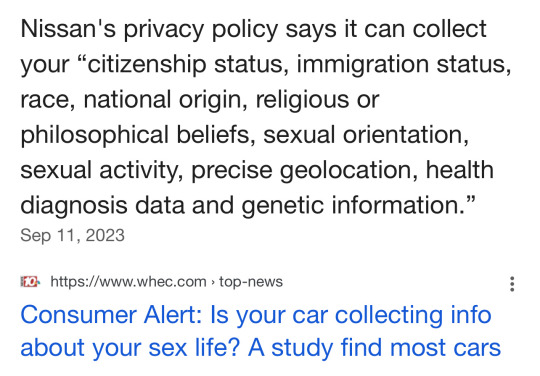
A new study has found that your car likely knows more about you than your mom. That is disconcerting, but what’s even more so is what is being done with your information. It’s all about the Benjamins. Our private information is being collected and sold.
The Mozilla Foundation, a non-profit that studies internet and privacy issues, studied 25 car manufacturers. And it found every manufacturer sold in America poses a greater risk to your privacy than any device, app or social media platform.
Our cars are rolling computers, many of which are connected to the internet collecting information about how you drive and where. New cars also have microphones and sensors that give you safety features like automatic braking and drowsy driver detection. Those systems are also providing information. Got GPS or satellite radio? Then your car likely knows your habits, musical and political preferences.
Did you download your car’s app which gives you access to even more features? Well that also gives your car access to your phone and all the information on it.
The study found that of the 25 car brands, 84% say they sell your personal data.
And what they collect is astounding.
One example the study sites is KIA’s privacy policy. It indicates the company collects information about your sexual activity. I initially didn’t believe it until I pulled KIA’s privacy policy and read it. And it’s right there in black and white. It says it collects information about your “ethnicity, religious, philosophical beliefs, sexual orientation, sex life, or political opinions.

And it says it can keep your info for “as long as is necessary for the legitimate business purpose set out in this privacy notice.”
Translation: Nissan can keep your information as long as they want to. And more than half of the manufacturers (56%) say they will share your information with law enforcement if asked.
(continue reading) more ↵
#politics#data mining#smart cars#spyware#privacy rights#surveillance state#new cars#big brother#nissan#kia#connected cars#consumer alert#panopticon
9K notes
·
View notes
Text
The mighty Japanese spider crab is larger than life. 🦀
These crabs roam along the seafloor on their long limber legs, which can span up to 12 feet from claw to claw! These slow-moving scavengers spend much of their time searching for dead and decaying fish, invertebrates, and seaweed on the seafloor. Yum!
#monterey bay aquarium#love for the deep#crabs as big as cars#we like big crabs and we cannot lie#getting a leg up on the clawmpetition
4K notes
·
View notes
Text

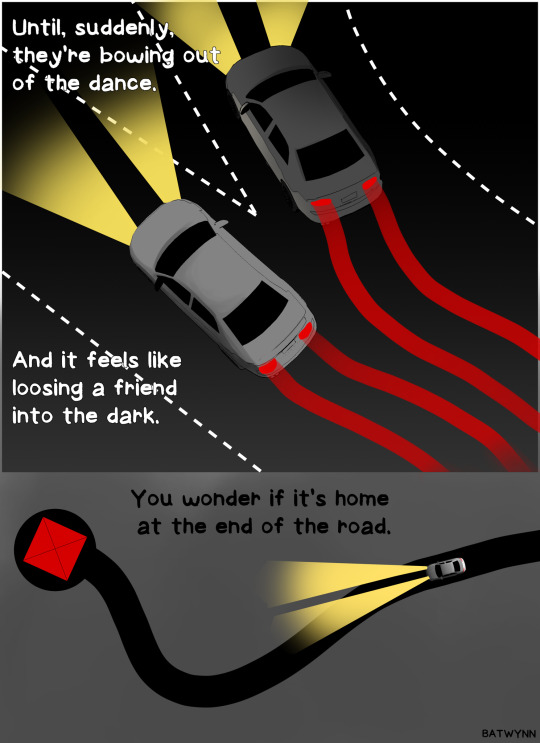
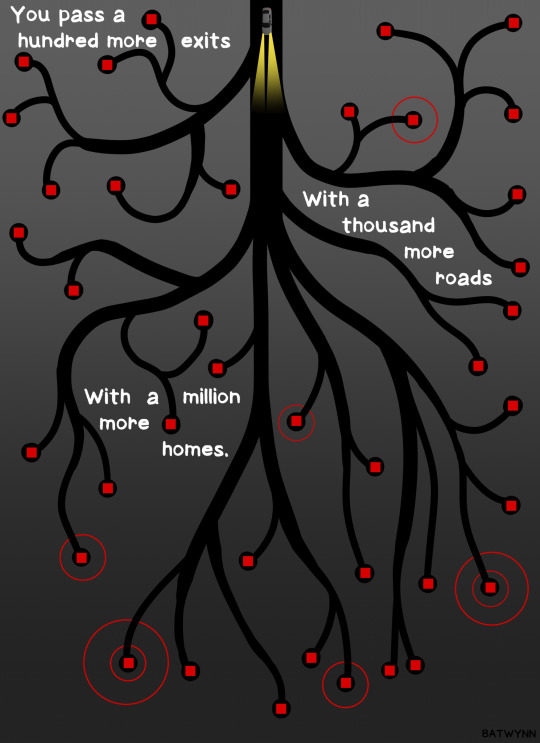
Long drives and feeling small.
18K notes
·
View notes




